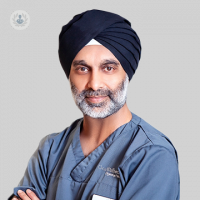How can acid reflux be treated?
Written by:Acid reflux, sometimes referred to as heartburn, is a common problem where stomach contents push back upwards into the oesophagus. Symptoms can manifest as a burning sensation behind the breastbone, an acidic taste in the mouth, a belching feeling that does not go away, and nausea, most commonly. Over time, these symptoms can be difficult to deal with on a regular basis, and many patients seek treatment for their acid reflux. Leading gastroenterologist and expert in acid reflux, Dr Devinder Bansi, explains how acid reflux can be treated.

Acid reflux is treated in a variety of different ways usually split up into three:
1. Lifestyle measures
There are lifestyle measures that individuals can engage in themselves such as adjusting their diet and eating patterns, avoiding eating late at night, avoiding large meals, chewing their food properly and slowly, and washing it down properly after eating.
There are certain foods that might precipitate symptoms so things like caffeine and alcohol, fatty foods, and sometimes spicy foods. These types of food and drink are all known to precipitate symptoms. Drinking carbonated or fizzy drinks can also aggravate symptoms. A whole range of lifestyle measures can be recommended by a medical professional to help the patient deal with their acid reflux.
2. Medication
The second tier for treatment of acid reflux is usually the introduction of medication, most commonly prescribed to reduce the amount of acid being produced in the stomach. Classic drugs in this category include drugs like omeprazole, which we refer to as proton pump inhibitors. These can be combined with other drugs that stimulate the contraction of the stomach to empty so the combination of the two reduces the amount of acid available to reflux back up.
3. Surgery
When all those measures have failed then surgery is often an option in a in a minority of patients - probably in about 5 or 10% at most.
Recently, there have been some advances in surgical treatments, in particular surrounding the management of reflux problems. The classic treatment over the years has been what is referred to as a 'Nissen fundoplication', which involves wrapping the upper part of the stomach in an axis, usually around 270 degrees, which then enhances the sphincter muscle and thus reduces the amount of acid reflux coming back up.
More recently we have seen the emergence of a device called a LINX device, which is a magnet that we attach around the outer part of the oesophagus. The procedure is done surgically as a keyhole technique under full anaesthetic, and it is performed by a surgeon. This procedure works by using a 'made to measure' magnet on the outside of the oesophagus, so that when food goes down through the oesophagus it pushes open the magnet and goes into the stomach. When the food is resting in the stomach the magnet opposes itself and acts as a sphincter. It's becoming increasingly obvious that the LINX device procedure is beneficial when selected in the right individual.
Find out more about acid reflux and its common causes and symptoms in Dr Bansi's previous article.


